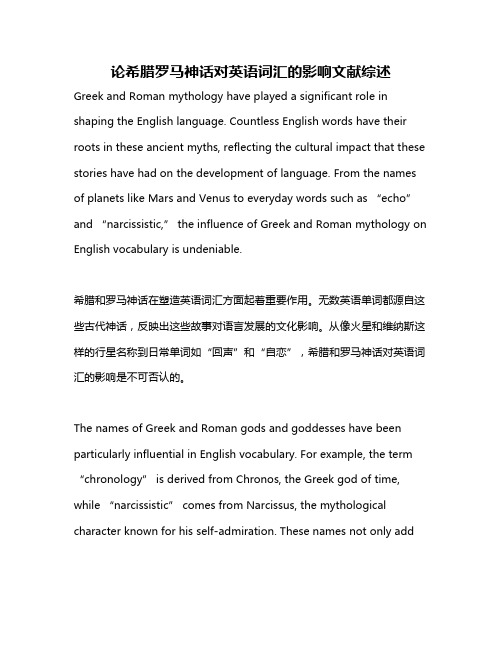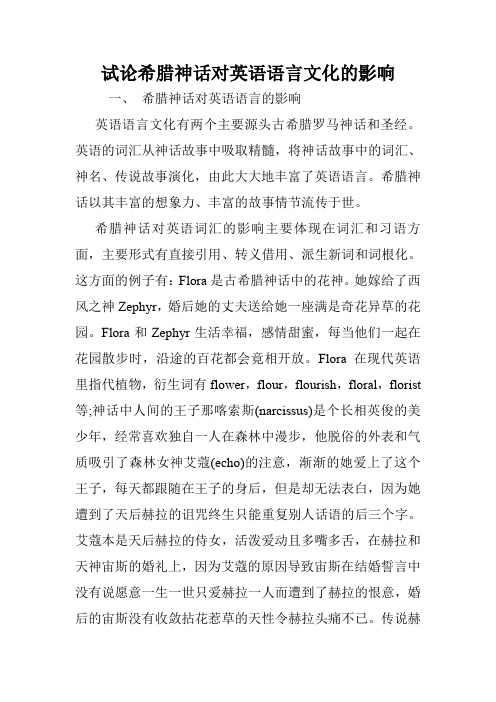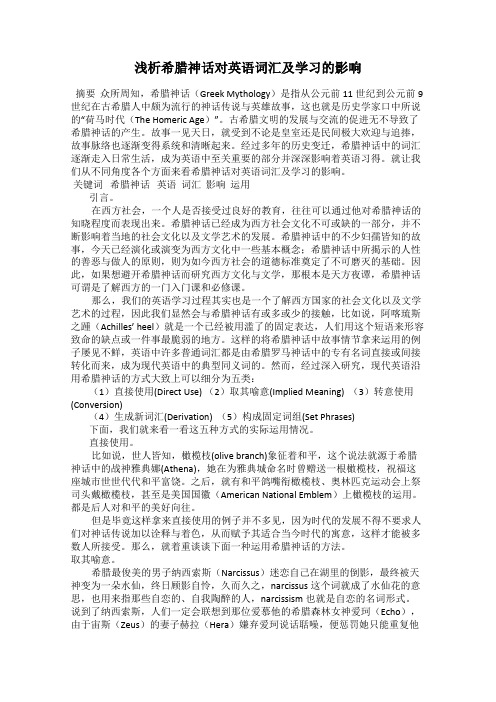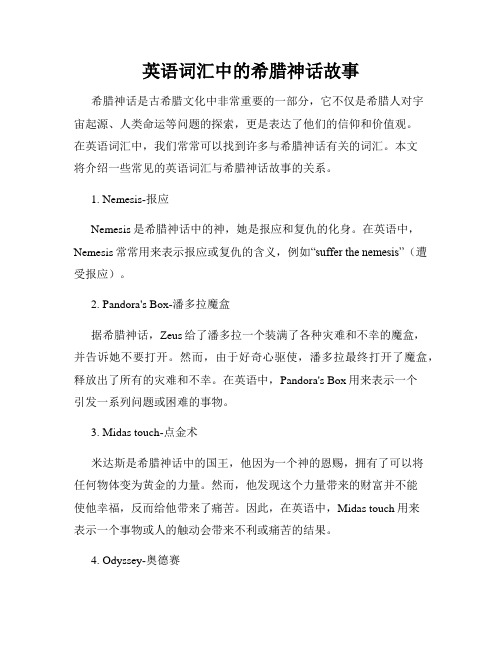希腊神话对英语词汇影响
希腊神话对英语词汇的影响

希腊神话对英语词汇的影响英语词汇的多样性和丰富性令人惊叹,但少有人知道,很多常见的英语词汇来源于古希腊神话。
在古希腊,一切普通现象和自然现象都有一个神话故事与之关联,这些神话故事影响着文学、艺术、历史和语言。
本文将介绍古希腊神话中的“羊圈”,并探讨希腊神话对英语词汇的影响。
“羊圈”是希腊神话学中的一个概念,它是希腊神话学家凯里斯托勒密(Circe)的代表作。
羊圈是一个岛屿,位于地中海的东部,有一群老羊常常在岛上徘徊,托勒密是一位女巫,她会用调谐和咒语把来访者变成猪。
传说,凯里斯托勒密以及她变出来的羊,吸引了大批人来到这个岛上,他们出于好奇或其他原因,都在这里体验到了许多神奇的事情。
希腊神话中,包括羊圈在内的众多神话故事,对英语词汇有着深远的影响。
例如,“羊圈”一词可以很容易地找到它在英译词中的反映“circle”,它的意思是“圆圈”,也是凯里斯托勒密的羊圈的意思。
另外,经常与羊圈有关的“siren”(塞壬)一词也可以在英语中找到,这个词指的是凯里斯托勒密的小精灵,它们会吹哨音唤醒羊圈中的老羊。
此外,“scapegoat”(替罪羊)一词也可以追溯到希腊神话,这个词指的是一个人受到一群人的责备,即使他没有做错任何事情,用以吸收社会上所有的不满或痛苦。
这个词源于《圣经》,据说,以色列总督亚伦有一年,他要将自己的羊羔洒上圣油,将它们放在草地上,然后将自己的罪孽和自己民族的罪孽转移到羊羔之上。
因此,羊羔成了“scapegoat”替罪羊,以及“scape”一词,在英语中指的是“脱离”或“逃跑”。
最后,“panic”(恐慌)一词也可以归因于希腊神话。
传说,希腊神话中有一种叫作“潘尼克斯”(Pan)的怪物,它耳朵大得像羊,口腔有着恐怖的声音,会让身边的人陷入恐慌中。
同样,“panic”一词在英语中也可以找到,它的意思是“恐慌”,也源自这只希腊神话中的怪物。
从以上分析可以看出,古希腊神话中的许多神话故事,都对英语词汇有着深远的影响。
论希腊罗马神话对英语词汇的影响文献综述

论希腊罗马神话对英语词汇的影响文献综述Greek and Roman mythology have played a significant role in shaping the English language. Countless English words have their roots in these ancient myths, reflecting the cultural impact that these stories have had on the development of language. From the names of planets like Mars and Venus to everyday words such as “echo” and “narcissistic,” the influence of Greek and Roman mythology on English vocabulary is undeniable.希腊和罗马神话在塑造英语词汇方面起着重要作用。
无数英语单词都源自这些古代神话,反映出这些故事对语言发展的文化影响。
从像火星和维纳斯这样的行星名称到日常单词如“回声”和“自恋”,希腊和罗马神话对英语词汇的影响是不可否认的。
The names of Greek and Roman gods and goddesses have been particularly influential in English vocabulary. For example, the term “chronology” is derived from Chronos, the Greek god of time, while “narcissistic” comes from Narcissus, the mythological character known for his self-admiration. These names not only adddepth and history to the English language but also serve as a reminder of the rich cultural heritage that underpins modern society.希腊和罗马神神和女神的名称在英语词汇中尤为重要。
试论希腊神话对英语语言文化的影响.doc

试论希腊神话对英语语言文化的影响一、希腊神话对英语语言的影响英语语言文化有两个主要源头古希腊罗马神话和圣经。
英语的词汇从神话故事中吸取精髓,将神话故事中的词汇、神名、传说故事演化,由此大大地丰富了英语语言。
希腊神话以其丰富的想象力、丰富的故事情节流传于世。
希腊神话对英语词汇的影响主要体现在词汇和习语方面,主要形式有直接引用、转义借用、派生新词和词根化。
这方面的例子有:Flora是古希腊神话中的花神。
她嫁给了西风之神Zephyr,婚后她的丈夫送给她一座满是奇花异草的花园。
Flora和Zephyr生活幸福,感情甜蜜,每当他们一起在花园散步时,沿途的百花都会竟相开放。
Flora 在现代英语里指代植物,衍生词有flower,flour,flourish,floral,florist 等;神话中人间的王子那喀索斯(narcissus)是个长相英俊的美少年,经常喜欢独自一人在森林中漫步,他脱俗的外表和气质吸引了森林女神艾蔻(echo)的注意,渐渐的她爱上了这个王子,每天都跟随在王子的身后,但是却无法表白,因为她遭到了天后赫拉的诅咒终生只能重复别人话语的后三个字。
艾蔻本是天后赫拉的侍女,活泼爱动且多嘴多舌,在赫拉和天神宙斯的婚礼上,因为艾蔻的原因导致宙斯在结婚誓言中没有说愿意一生一世只爱赫拉一人而遭到了赫拉的恨意,婚后的宙斯没有收敛拈花惹草的天性令赫拉头痛不已。
传说赫拉在天宫中正为此郁闷,拨开云雾看到了人间森林中艾蔻跟踪那喀索斯的一幕,遂心生一计,惩罚艾蔻永远得不到所爱人的心。
后来那喀索斯忍不住问艾蔻你是谁呀?,艾蔻只能不断的重复是谁呀,是谁呀而遭到那喀索斯的讨厌,最后艾蔻抑郁而终,死后变成了山谷中的回声,而那喀索斯也被赫拉施以诅咒,爱上了自己水中的倒影,而变成了一株水仙花,后来的他的名字还引申为自恋,自我陶醉的意思;著名运动品牌耐克的商标也来源于希腊神话故事,耐克(Nike)是神话中的胜利女神,这一品牌正是源于女神名字的引申含义。
从希腊神话看英语词汇的词源理据

从希腊神话看英语词汇的词源理据(原创版)目录1.希腊神话对英语词汇的影响2.英语词汇的词源理据3.从希腊神话看英语词汇的词源理据正文希腊神话对英语词汇的影响非常深远,许多英语单词和短语都源自于古希腊神话。
这些词汇的词源理据可以通过希腊神话中的人物、事件和地点来解释。
首先,希腊神话中的人物对英语词汇的影响非常大。
例如,阿波罗(Apollo)是希腊神话中的太阳神和音乐神,他的名字成为了英语中“apology”(道歉)和“apocalyptic”(启示录)等单词的词根。
另一个例子是普罗米修斯(Prometheus),他是希腊神话中偷火给人类的神,他的名字成为了英语中“promethean”(有先见之明的)和“promiscuous”(杂交的)等单词的词根。
其次,希腊神话中的事件也对英语词汇产生了影响。
例如,特洛伊战争(Trojan War)是希腊神话中最著名的战争之一,这场战争的名字成为了英语中“trojan”(特洛伊的)和“trojan horse”(特洛伊木马)等单词的词根。
另一个例子是赫拉克勒斯(Heracles)的十二项任务,他的名字成为了英语中“herculean”(巨大的)和“hercules”(大力士)等单词的词根。
最后,希腊神话中的地点也对英语词汇产生了影响。
例如,奥林匹斯山(Mount Olympus)是希腊神话中众神的家园,这个名字成为了英语中“olympic”(奥林匹克的)和“olympiad”(奥林匹克运动会)等单词的词根。
另一个例子是达尔达尼厄斯(Troy),这是特洛伊战争的发生地,这个名字成为了英语中“trojan”(特洛伊的)和“troy weight”(特洛伊重量)等单词的词根。
从希腊神话看英语词汇的词源理据,我们可以发现许多英语单词和短语都源自于古希腊神话。
这些词汇的词源理据可以通过希腊神话中的人物、事件和地点来解释。
古希腊词汇对英语的影响

古希腊词汇对英语的影响
古希腊词汇对英语产生了深远的影响。
一些古希腊词汇直接转化为英语中的普通词汇,如英语中的许多形容词和名词都来源于古希腊词汇。
此外,古希腊词汇还对英语习语的形成和发展产生了影响,许多英语习语都来源于古希腊神话和传说。
具体来说,古希腊词汇对英语的影响表现在以下几个方面:
1.词汇扩充:古希腊词汇成为英语中新增词汇的主要来源之一。
一些古希腊词汇被直接
引入到英语中,成为英语中的常用词汇。
2.语言起源解析:古希腊词汇对于研究英语语言的起源和演变具有重要意义。
通过对古
希腊词汇的研究,可以深入了解英语词汇的词源和意义演变过程。
3.文化理解:古希腊词汇是古希腊文化的重要组成部分,通过对古希腊词汇的了解,可
以更好地理解古希腊文化的内涵和特点,从而更好地理解英语语言和文化。
总之,古希腊词汇对英语的影响广泛而深远,对于英语词汇的学习、理解和运用都有着重要的作用。
浅析希腊神话对英语词汇及学习的影响

浅析希腊神话对英语词汇及学习的影响摘要众所周知,希腊神话(Greek Mythology)是指从公元前11世纪到公元前9世纪在古希腊人中颇为流行的神话传说与英雄故事,这也就是历史学家口中所说的“荷马时代(The Homeric Age)”。
古希腊文明的发展与交流的促进无不导致了希腊神话的产生。
故事一见天日,就受到不论是皇室还是民间极大欢迎与追捧,故事脉络也逐渐变得系统和清晰起来。
经过多年的历史变迁,希腊神话中的词汇逐渐走入日常生活,成为英语中至关重要的部分并深深影响着英语习得。
就让我们从不同角度各个方面来看希腊神话对英语词汇及学习的影响。
关键词希腊神话英语词汇影响运用引言。
在西方社会,一个人是否接受过良好的教育,往往可以通过他对希腊神话的知晓程度而表现出来。
希腊神话已经成为西方社会文化不可或缺的一部分,并不断影响着当地的社会文化以及文学艺术的发展。
希腊神话中的不少妇孺皆知的故事,今天已经演化或演变为西方文化中一些基本概念;希腊神话中所揭示的人性的善恶与做人的原则,则为如今西方社会的道德标准奠定了不可磨灭的基础。
因此,如果想避开希腊神话而研究西方文化与文学,那根本是天方夜谭,希腊神话可谓是了解西方的一门入门课和必修课。
那么,我们的英语学习过程其实也是一个了解西方国家的社会文化以及文学艺术的过程,因此我们显然会与希腊神话有或多或少的接触,比如说,阿喀琉斯之踵(Achilles’ heel)就是一个已经被用滥了的固定表达,人们用这个短语来形容致命的缺点或一件事最脆弱的地方。
这样的将希腊神话中故事情节拿来运用的例子屡见不鲜,英语中许多普通词汇都是由希腊罗马神话中的专有名词直接或间接转化而来,成为现代英语中的典型同义词的。
然而,经过深入研究,现代英语沿用希腊神话的方式大致上可以细分为五类:(1)直接使用(Direct Use) (2)取其喻意(Implied Meaning) (3)转意使用(Conversion)(4)生成新词汇(Derivation) (5)构成固定词组(Set Phrases)下面,我们就来看一看这五种方式的实际运用情况。
英语词汇中的希腊神话故事

英语词汇中的希腊神话故事希腊神话是古希腊文化中非常重要的一部分,它不仅是希腊人对宇宙起源、人类命运等问题的探索,更是表达了他们的信仰和价值观。
在英语词汇中,我们常常可以找到许多与希腊神话有关的词汇。
本文将介绍一些常见的英语词汇与希腊神话故事的关系。
1. Nemesis-报应Nemesis是希腊神话中的神,她是报应和复仇的化身。
在英语中,Nemesis常常用来表示报应或复仇的含义,例如“suffer the nemesis”(遭受报应)。
2. Pandora's Box-潘多拉魔盒据希腊神话,Zeus给了潘多拉一个装满了各种灾难和不幸的魔盒,并告诉她不要打开。
然而,由于好奇心驱使,潘多拉最终打开了魔盒,释放出了所有的灾难和不幸。
在英语中,Pandora's Box用来表示一个引发一系列问题或困难的事物。
3. Midas touch-点金术米达斯是希腊神话中的国王,他因为一个神的恩赐,拥有了可以将任何物体变为黄金的力量。
然而,他发现这个力量带来的财富并不能使他幸福,反而给他带来了痛苦。
因此,在英语中,Midas touch用来表示一个事物或人的触动会带来不利或痛苦的结果。
4. Odyssey-奥德赛《奥德赛》是荷马的史诗之一,讲述了希腊英雄奥德修斯在归乡途中所经历的冒险故事。
在英语中,Odyssey用来表示一个冒险旅程或长期且有许多挑战的旅程。
5. Narcissism-自恋纳西索斯是希腊神话中的美少年,他因为过度自恋而从他人的眼中看不到别人的存在。
在英语中,Narcissism用来表示一种过度自恋或自我崇拜的倾向。
6. Achilles' heel-跟腱阿喀琉斯是希腊神话中的英雄,他在战斗中无敌,唯独脚跟上的一处弱点没有受到保护。
在一场战斗中,他的脚跟被敌人射中,最终导致了他的死亡。
因此,Achilles' heel在英语中用来表示一个人的弱点或易受攻击的部分。
7. Herculean-艰巨的赫拉克勒斯(Hercules)是希腊神话中的英雄,他在十二个艰巨的任务中展现出了非凡的勇气和力量。
源于希腊神话故事的英语词汇的应用

例;Oedipus complex即 恋母情结(俄底浦斯弑父娶母),弗洛伊德用来表示儿子对父亲带有敌意,并对自己的母亲 有爱慕感情的一种心理病态。“弗洛伊德又创造了Electra Complex,即厄勒克特拉情结( 恋父情结)与俄底浦斯情结对应,来描述女童对父亲的过度依恋和对母亲相应的敌视。”这一术语来自希腊神话中厄勒克特拉的故事,因母亲与其情人谋杀了她的父亲,故决心替 父报仇,最终她与其兄弟杀死了自己的母亲
三传媒
商标和广告也有一定的影响。
例;美国著名的迈达斯汽 车维修公司的商业口号“Trust the Midas touch”, 就出自于希腊神话中迈达斯国王点石 成金的故事。
迈达斯国王的魔法可使他所触及的任何东西都变成黄金,现代英语中的“Mida stouch”通常用在商业领域指一个人财运亨通,无论干什么行当,都能成 功。迈达斯公司的口号形象地告诉消费者,相信他们的服务,只要手指一动,汽车马上灵通 。
同时希腊神话中也衍生很多的的习语。例如我们都知道特洛伊之战,从特洛伊之战中,因为不和女神厄里斯(Eris)留下一个刻有“献给最美者”的金苹果,引起了雅典娜、赫拉和维纳斯的纷争,所以那只引起了纠纷的金苹果被称作apple of discord(不和的根源、发生纠纷的事端)。又因为三位女神找到了牧羊人Paris并用最大的疆土”,“最智慧的头脑”和“最美丽的女人”作为诱惑,Paris选择了最美的的女人,所以Judgment of Paris就是爱江山不爱美人。在特洛伊之战中,Achille虽然全身刀枪不入,但脚根是唯一的缺点,所以Achilles’heel意指“金无足赤,人无完人”,特指唯一致命弱点、缺点。特洛伊战争最后,雅典人使用了The Trojan horse,。The Trojan Horse经过不断引用已成为一个广泛流传的成语,常用来比喻the hidden danger(暗藏的危险);the covert wreckers(内奸):to engage in underhandactivities等意义。同时希腊人认为引发特洛伊之战的是海伦,所以Helen of Troy就是指红颜祸水。这样通过一个特洛伊之战我们就可以学习五六个习语。并弄明白了前因后果,使习语很难忘记。
- 1、下载文档前请自行甄别文档内容的完整性,平台不提供额外的编辑、内容补充、找答案等附加服务。
- 2、"仅部分预览"的文档,不可在线预览部分如存在完整性等问题,可反馈申请退款(可完整预览的文档不适用该条件!)。
- 3、如文档侵犯您的权益,请联系客服反馈,我们会尽快为您处理(人工客服工作时间:9:00-18:30)。
Greek Mythology‟s Influence on English V ocabularyIn the long-term historical process, English has absorbed a large amount of foreign words which has many Greek words because of events about culture, trade, diplomacy and invasion. Especially during the period of Renaissance Greek culture was more popular. As the most secularized, most complete and most rich mythology system, Greek mythology has a very important place. V ocabulary came from Greek mythology needs to be paid more attention when people study English.The vocabulary originated from Greek mythology can be seen everywhere in English-speaking countries. Nike is a well-known brand of sport shoes in America which borrowed the name of goddess of Victory. The names of characters in Greek mythology were also used in science and military. American scientist named the plan of exploring space as Apollo program. In addition, the vocabulary from Greek mythology often appeared in news. For example, “The National Aeronautic and Space Administration had called it a …success- oriented‟ schedule to get the space shuttle flying again, but the odyssey of …Discovery‟ was beset with various problems.”The word “odyssey”was used in this news, and this word originated from a hero named Odysseus in Greek mythology. After the Trojan War Odysseus spent ten years and went through many hardships to get home. The “odyssey” here means the difficulties “Discovery”met in space exploration (Wu, 2006). From above all, Greek mythology presents its great influence on English vocabulary. The name of things, places and some English idioms were all influenced by Greek mythology. In addition, English vocabulary also inherited Greek mythology.Greek mythology‟s influence on basic vocabulary mainly appeared in the reason whythings get their names. The words fate, echo and iris all came from the names of goddess in Greek mythology. In Greek mythology, Helicon is where Muses lives, and helicon means the inspiration source of poem in modern English. Narcissus also has the meaning of somebody who loves himself. Narcissus is a beautiful young man in Greek mythology. Every goddess saw him was falling in love with him, including Echo. But Narcissus does not love any female. Soon Echo died of this. After Echo‟s death, other goddesses make Narcissus fall in love with his own reflection as punishment. He fell in love with his reflection in the lake and did not want to leave. At last he died beside the lake. After his death, he changed into a flower and the flower were named as narcissus and because he fell in love with his own reflection the word narcissus has the meaning of somebody who loves himself. In addition, some names of months and the names of the nine planets in solar system except the earth were all come from gods‟ names in Greek mythology. (Luo, 2005)Place names belong to proper nouns in English. It is an important part in English vocabulary. Many place names originated from Greek mythology. The name of Europe came from Europa who was a princess in mundane world. Zeus fell in love with her and she had a son for Zeus on a piece of land. Then this land was named by her name. The name of Athens also came from Greek mythology. Athena and Poseidon both want to be the patron of a land in south of Attica and they asked Zeus as the intercessor of their competition. Poseidon brought a horse and Athena gave an olive tree as gifts. The local people chose Athena as their patron and hence the land was name by Athena‟s name. With the same, the name of Atlas Mountains in Africa was originated from the name of Atlas in Greek mythology. Atlas is Titans‟ offspring who is strong and huge that nobody can match him. After seeing Medusa, hechanged into mountains. The Atlantic‟s name also came from this story because the ancient thought Atlas was in far west. (Luo, 2005)There are many idioms in English coming from Greek mythology. Hercules is a hero without equal in strength in Greek mythology. Hera let him to finish twelve very difficult tasks. People usually use herculean task to describe arduous tasks. A goddess called Eris threw a gold apple and let Hera, Athena and Aphrodite to fight for the honor of the most beautiful goddess. Zeus let them ask Paris the prince of Trojan to judge it. To get the gold apple, they all promised to give good to Paris. Hera promised to give him a large kingdom and great power. Athens said she will give him wisdom and the honor of victory. However, Aphrodite promised to let the most beautiful woman be his wife. Paris chose Aphrodite. After that Paris spirited away Helen and leaded to the Trojan War. Since then, an apple of disorder means the cause of a misfortune of disaster (Sheng, 2010).The relationship between culture and vocabulary is not unidirectional, they have influenced each other. Greek mythology has influenced on the form of English vocabulary, while English vocabulary inherits Greek mythology (Luo, 2005). Lin H.B. and Jiang Y.M. said, “Language records and stores all the achievements of humane civilizations.”in their books (2002). The vocabulary came from Greek mythology has the plot of Greek mythology and cultural meaning. It records and reflects the thought of ancient Greeks. People use English broadly in daily dialogues, public speaking, affair comments and international communications. The cultural meanings of English vocabulary were spread by using English (Luo, 2005).Greek mythology has a close relationship with English vocabulary. Greek mythologyhas influenced English vocabulary greatly. This article is just a preliminary study of Greek mythology‟s influence on English vocabulary. There are a lot of words have relationship with Greek mythology and have cultural meaning in English. Making advanced research about Greek mythology is helpful for us to learn English. Learn Greek mythology can help students have a better understanding of English vocabulary and their cultural background. It can also improve students‟ interests in learning English vocabulary. Culture can influence the form and development of vocabulary, while language is the carrier of culture. Knowing some knowledge of western culture is good for English vocabulary study, because vocabulary is deeply rooted in culture.Luo, X.L. “Greek Mythology and the Learning English V ocabulary.”Journal of Hubei Institute of Education 22 (2005): 32-34 (CNKI)Sheng, J. “Discussion on Influence of Greek and Roman Mythology upon English Words.”SCIENCE & TECHNOLOGY INFORMATION 13 (2010): 205 (CNKI)Wu, G.T. “Preliminary Study of Greek Mythology‟s Influence on English V ocabulary.”Journal of Suihua University 26 (2006): 132-134 (CNKI)。
